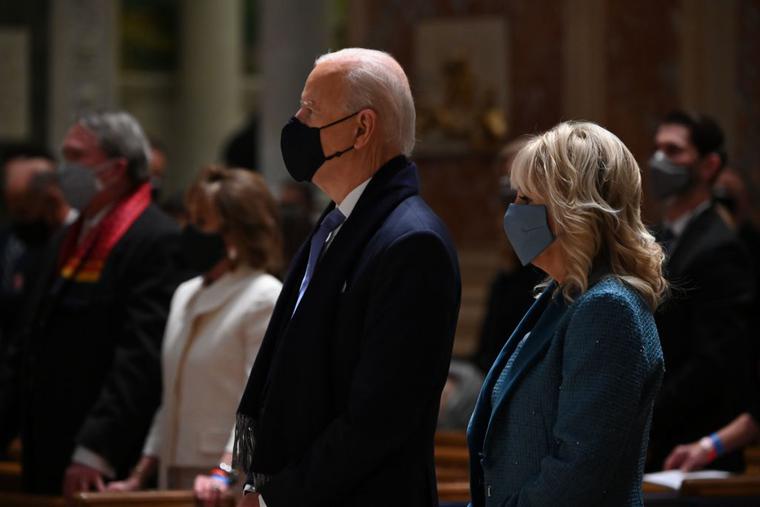Will The Catholic Church Pass the Joe Biden Test?
The U.S. bishops’ collaboration with the new administration on areas of common ground cannot be accompanied by actions that spread confusion over Catholic teaching in other areas.

When Joe Biden took the oath of office on Jan. 20, he became only the second Catholic president in U.S. history. The first, John F. Kennedy, was frequently and famously questioned over whether he was, in fact, a servant of the pope.
With Biden, a different question must be asked, one that is focused less on the commander-in-chief and more on the Church: How will the Catholic hierarchy treat a president who rejects aspects of Catholic moral teaching?
The U.S. Conference of Catholic Bishops (USCCB) is striving to provide the answer. In the wake of the election, Archbishop José Gomez, the USCCB’s president, stated that Biden’s policy positions create a “difficult and complex situation.” While professing to be Catholic, Biden has pledged to advance distinctly un-Catholic policies on religious freedom, human sexuality and abortion, including pledging to make Roe v. Wade“the law of the land.” Archbishop Gomez subsequently established a special working group of bishops tasked with coordinating the Church’s interaction with — and stance toward — Biden and his administration.
Yet the hope of coordination is already fading.
On Inauguration Day, the USCCB issued a strong statement expressing hope that Biden reverses his immoral plans to expand abortion. Shockingly, one of the bishops’ conference’s own members, Cardinal Blase Cupich of Chicago, responded by condemning the statement and not Biden’s policy positions. This sends a message of confusion and contradiction on a clear moral issue.
This incident comes on the heels of another one. In late November, mere days after the working group’s creation and shortly before his elevation to cardinal, Archbishop Wilton Gregory of Washington, D.C., waded into one of the most charged parts of the discussion.
Speaking with a reporter, Cardinal Gregory declared that he would allow Biden to receive Holy Communion. The cardinal’s words send a strong message of confusion to Catholics and non-Catholics alike. They give the appearance that, at least in Washington, Biden’s rejection of Catholic teaching is acceptable and undeserving of rebuke. Yet that is not what the Catholic Church teaches.
Holy Communion is the core of Catholic life. The part of the Mass in which the faithful receive bread and wine that have been transformed into the Body and Blood of Jesus Christ, it is the “source and summit of the Christian life,” according to the Catechism of the Catholic Church. It is a sacred experience that draws the recipient into the life of Christ and makes it possible for them to lead a life of holiness. It is only open to those Catholics who are not persisting in a state of mortal sin — the most serious kind in Catholic teaching.
Which brings us to Biden. The Church teaches that public officials who publicly support morally offensive policies, including abortion, should not present themselves for Holy Communion. In 2004, under the leadership of the cardinal who would go on to become Pope Benedict XVI, the Vatican congregation charged with upholding doctrine released a document entitled, “Worthy to Receive Holy Communion: General Principles.” It states that when a person’s “formal cooperation” with abortion “becomes manifest” — which includes “consistently campaigning and voting for permissive abortion” — Catholic politicians should be denied Holy Communion. The Church’s moral teaching does not get clearer than that.
Bishops are required to take this issue seriously. It has led Bishop Thomas Paprocki of Springfield, Illinois, to deny Holy Communion to numerous pro-abortion Catholic politicians. The list includes Sen. Dick Durbin, who voted against a bill banning abortions after 20 weeks, as well as several prominent members of the Illinois Legislature who supported legislation making abortion a “fundamental right” in Illinois.
The Vatican’s guidance is still in force. When the clergy — whether a bishop, archbishop or cardinal — treats it as non-binding, they give the false perception that Catholic teaching on abortion is also optional. Such actions say to all who see them that the Catholic Church does not truly believe or practice what it preaches.
The Catholic Church lays claim to truth, but when push comes to shove, will it defend that truth? If it doesn’t Catholics lose confidence in the integrity of the Church’s teaching; non-Catholics get the sense that the Church stands for nothing.
Either way, moral clarity gives way to confusion, and as Scripture makes clear, confusion does not come from God.
Fortunately, many Catholic leaders recognize this reality. Archbishop Charles Chaput, now archbishop emeritus of Philadelphia, put it well in early December. He wrote that bishops who make unilateral decisions on Holy Communion give “scandal to their brother bishops and priests and to the many Catholics who struggle to stay faithful to Church teaching.” He further wrote that Biden’s promise to enact policies contrary to that teaching “requires a strong and consistent response from Church leaders and [the] faithful.”
What that response will look like remains to be seen. The Catholic Church has an opportunity to work with the Biden administration to advance justice and peace on many issues, including immigration reform and relief from the ravages of the coronavirus pandemic. Yet collaboration on areas of common ground cannot be accompanied by actions that spread confusion over Catholic teaching in other areas. After all, that moral teaching will be around and unchanged long after Biden has left office.
- Keywords:
- joe biden
- catholic church
- us bishops
- joe biden test















